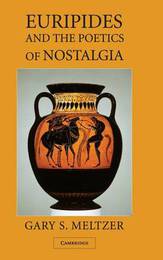
|
Euripides and the Poetics of Nostalgia
Hardback
Main Details
| Title |
Euripides and the Poetics of Nostalgia
|
| Authors and Contributors |
By (author) Gary S. Meltzer
|
| Physical Properties |
| Format:Hardback | | Pages:280 | | Dimensions(mm): Height 235,Width 160 |
|
| Category/Genre | Literary studies - classical, early and medieval |
|---|
| ISBN/Barcode |
9780521858731
|
| Classifications | Dewey:882.01 |
|---|
| Audience | | Professional & Vocational | |
|---|
|
Publishing Details |
| Publisher |
Cambridge University Press
|
| Imprint |
Cambridge University Press
|
| Publication Date |
16 October 2006 |
| Publication Country |
United Kingdom
|
Description
Branded by critics from Aristophanes to Nietzsche as sophistic, iconoclastic, and sensationalistic, Euripides has long been held responsible for the demise of Greek tragedy. Despite this reputation, his drama has a fundamentally conservative character. It conveys nostalgia for an idealized age that still respected the gods and traditional codes of conduct. Using deconstructionist and feminist theory, this book investigates the theme of the lost voice of truth and justice in four Euripidean tragedies. The plays' unstable mix of longing for a transcendent voice of truth and skeptical analysis not only epitomizes the discursive practice of Euripides' era but also speaks to our postmodern condition. The book sheds light on the source of the playwright's tragic power and enduring appeal, revealing the surprising relevance of his works for our own day.
Author Biography
Gary Meltzer has taught at George Washington University, Catholic University, and Eckerd College. He is currently adjunct professor of humanities at Villanova University. A visiting scholar at the American Academy in Rome, he has contributed to Classical Antiquity, Transactions of the American Philological Association, Helios, Classical and Modern Literature, and Text and Presentation.
ReviewsReview of the hardback: 'Although Euripidean dramas can be loaded with piercing scepticism and cynicism, they also express a yearning for moral codes of the heroic past, where the truth was unchangeable and transparent, and justice authorised by gods, as opposed to relativist truths gained by sophistic argumentation. ... The writer parallels the Athenian situation with modern Western, especially American, change in social and cultural conduct, the war on terrorism and the rapidly emerging change from written book culture to the information age. ... With its detailed bibliography and indexes, and quotations in original Greek with translations, this book is valuable for scholars of ancient drama as well as for those studying early philosophy.' De novis libris iudicia
|